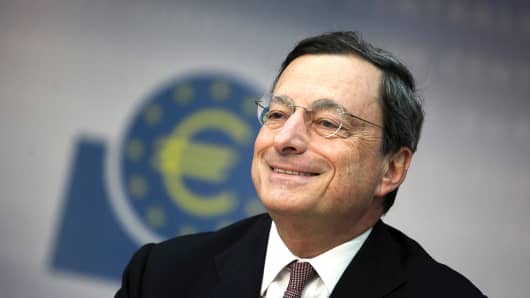"Super" Mario Draghi of the European Central Bank has a super problem: the markets might love him, the bankers might love him, politicians from Athens to Dublin might love him, but the German people don't. He's been called anything from "bankers' buddy" to "counterfeiter of coins", and depicted by the tabloid press as a devil sporting horns and a trident, set against a distinctly angelic Bundesbank president Jens Weidmann.
So what? In his position, he should accept and maybe expect more than his fair share of criticism. Comes with the office. True. But if only if were that simple.
Germany's old central bank, the Bundesbank or often lovingly called "die Buba", might only be one of now 17 national central banks that make up the ECB. But it represents the biggest economy, and with that money base in the euro area it will never be just another national central bank. The Buba, with its clout and reputation, with its stubbornly defended and often flouted independence... this Buba was and is the blueprint for the ECB. And at least in Germany, it will rightly or wrongly always be set against and compared with the specter of the old Buba.
You see, the Germans have always had a very special (and often romantically clouded) relationship with their old currency, the deutschmark, and the guardians of that currency, the Buba. For the Germans, this dynamic duo symbolizes the country's post-war economic miracle. Both have long become legend. And legends are difficult to match, let alone outshine.
It's a legend that the deutschmark was more stable than the euro ; it's a legend that in deutschmark times Germany enjoyed more price stability and it's a legend that the Buba never acted politically. All not true! But there it is: the Buba president appears to the German public as an angel — or at least a Knight Templar defending German price stability and wealth — and an Italian ECB president as the devil who is out to destroy the country's post-war prosperity and empty peoples' savings accounts.
Opinion polls show that less than 20 percent of the people asked said they "trusted" Mario Draghi. Almost 50 percent stated they did not. That must smart, no matter how much ECB might play this little "trust" problem.
No Bundesbank president would ever have had that problem. The Bundesbank has been the one institution in Germany that has, throughout its history, enjoyed more trust and credibility at home than any other institition — including the church! It was always a tall order for any ECB president to match, let alone beat that. But Draghi clearly has more problems than Trichet before him. And the festering conflict or arguments and opinions between him and Buba president Weidmann are not helpful.
Draghi did the best he could under the circumstances. He went on the (friendly) offensive: He suggested that were the German parliament, the Bundestag, to invite him to explain himself and the ECB's actions, he would happily accept. His predecessor, Jean-Claude Trichet, had indeed been invited by the Bundestag a couple of years ago to speak to the assembly; but not under a cloud of criticism, but of appreciation.
Draghi's words were heard, and invitations were promptly issued. So far, however, not to speak in front of the plenary session of the Bundestag, but to appear in front of a number of non-public committees — such as the undoubtedly powerful budget committee. But that was not the "I will explain myself to the German people" appearance Draghi and his team must have had in mind. Still, it's early days, and an invitation by the Bundestag might yet come.
As a prelude to his German "charm offensive", Draghi will speak at the annual gathering of the who's who in German industry, not banking for a change: the annual conference of the German federation of Industry, the BDI. A good opportunity for the ECB president to "test the trust waters"; because while the German government has whole-heartedly joined the chorus that defended, nay praised Draghi's bond buying plans, German industry is less convinced. Especially the German Mittelstand, the small and midcaps, suffer from lack of access to credit.
So "Super" Mario will maybe get a first taste of the explaining he has to do to convince the Germans that ECB policy is protecting German wealth, not plundering it. The tougher questions, no doubt, will be in the budget committee of the Bundestag. Shame that THIS hearing shall not be in public.


